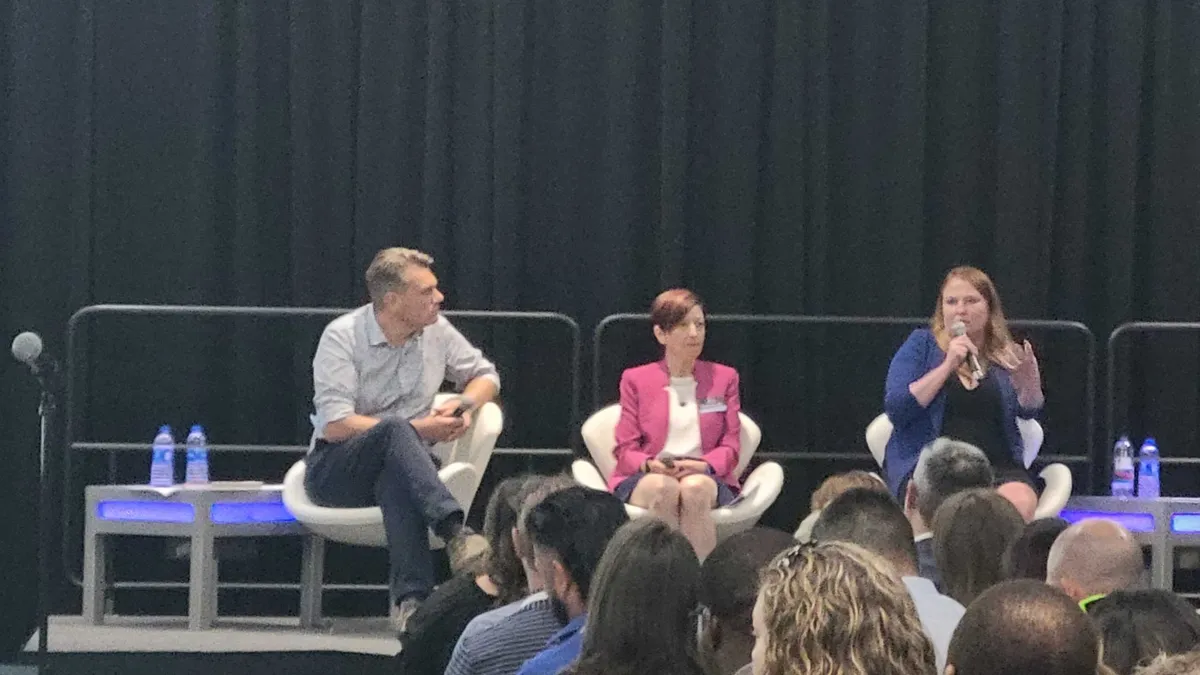Dive Brief:
- Over 60% of property managers consider making their day-to-day operations more efficient one of their top three professional challenges, according to new survey data released last week at the National Apartment Association’s Apartmentalize 2022 conference.
- Maximizing revenue and profits was cited by 54% of respondents as a top-three concern, followed by human resources, staffing and recruitment at 49%.
- In the previous edition of the survey, conducted in August 2021 by Santa Barbara, California-based real estate management software provider AppFolio, HR and staffing issues stood out as the strongest concern among respondents by far. Over half — 51% — reported it as their top concern and 79% counted it in their top three. As of April 2022, 25% of respondents still consider staffing their foremost challenge.
Dive Insight:
An in-person poll of 176 attendees at the conference session, “Overcoming 2022’s Top Industry Challenges,” skewed closer to the August 2021 reading than the April 2022 number. Fifty-six percent chose human resources, staffing and recruitment as their greatest challenge at the moment.
“[HR and staffing are] top of mind for all areas, all levels of the business,” said Donna Smith, president of West Fargo, North Dakota-based Enclave Property Management and panel presenter, pictured on the right.
Many of the movements in the data between August 2021 and April 2022 can be attributed to inflation and the rising costs of doing business, according to Smith. Saving and earning money are now top of mind for more property managers. Inflation pressures have become the No. 1 challenge in maximizing profits, while demand for higher compensation is a pressing concern in the HR sphere, more than it was even eight months before.
In some ways, the solutions to the industry’s concerns are interconnected, according to Smith. All industry challenges will ultimately influence a company’s profitability. Staffing is itself a budgetary concern, and more efficient processes, including automation enabled by tech, can reduce a company’s spending on staffing.
The keys to operational efficiency
In order to find ways where company processes may be inefficient, Smith’s first suggestion is to ask their teams about their struggles or frustrations. Then, managers should identify and implement process improvements, complete with follow-up and feedback about whether new processes solve the issues.
On average, respondents struggling with operational efficiencies said that finding high-quality vendors was their biggest challenge, followed by the rising cost of materials and the need to reduce overall costs, according to the survey data. In a poll of the audience present at the Apartmentalize session, 27% chose leasing automation as their top challenge, 31% chose vendor partnerships and 41% chose centralized administration.
Smith offered the following solutions to these three problems:
- Leasing automation reduces the need for on-site staff to perform many of its traditional tasks, including tours, applications and even move-in inspections. by allowing prospects to guide themselves through the process. According to Smith, the advent of virtual tours can reduce the number of prospects visiting a property by 10% to 20%.
- Finding and keeping vendors is particularly pertinent for Enclave’s business, according to Smith, as snow removal contractors are vital multifamily vendors in North Dakota. Among the ways in which the company cultivates its relationship with its snow removal vendor is by sharing resident feedback and data on curb appeal and lawn care. Smith recommends opening strong lines of communication with preferred vendors, who should be treated as partners in the business.
- The centralized administration model allows employees that may not be based in the same area as the rest of the site staff to take care of reports and other tasks that do not require on-site work, including purchase orders, delinquency contacts and workflows.
“The pandemic proved there’s a lot of things you don’t have to do on site,” Smith said. “We hire on-site staff ultimately for customer service, and if that’s not their No. 1 priority then they’re not working efficiently. That’s not what we hired them to do. If they’re only doing it once a month or week, they’re not doing it efficiently.”











